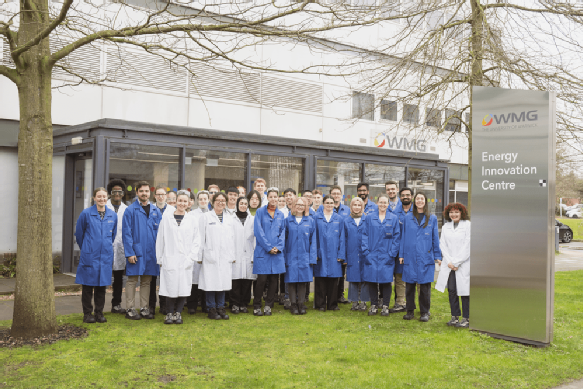WMG Insights
How the WMG Faraday Battery School is supporting the next generation of researchers
Dr Ivana Hasa is an Assistant Professor of Electrochemical Materials, WMG and a member of the Faraday Institution Training & Diversity Panel
WMG recently welcomed a diverse cohort of 30 PhD students from prestigious universities across the UK who participated in the annual Faraday Battery School in partnership with the Faraday Institution.
School in partnership with the Faraday Institution.
The course offered a valuable learning experience by delving into the opportunities and challenges of the battery technology sector and covering a broad range of topics including, battery chemistries (lithium-ion, beyond-lithium-ion, and sodium-ion), advanced characterisation methods for battery materials and cells up to module and pack design, battery management systems, battery safety and testing, and battery second life and recycling.
The joint development of the training programme offered in the course is a demonstration of the excellent cooperation between WMG at the University of Warwick and the Faraday Institution.
It has been an absolute pleasure to engage and interact with such a dynamic, motivated, inspired and diverse cohort of delegates. From lectures to hands-on lab sessions, networking events and career panels, the course offers an excellent training opportunity to the next-generation talent pipeline in the battery sector.
The course is well aligned with the future battery industry needs identified in the UK Battery Strategy, highlighting the need to develop training initiatives and skill-enriching schemes to support the needs of the UK battery sector.
One of the highlights of the week, was the opportunity for the attendees to learn directly from some of the most esteemed names in the field. From renowned academics to industry leaders, each speaker shared their insights, experiences, and visions for the future of battery technology. Topics ranged from the fundamental principles of energy storage to the latest advancements in materials science and beyond. With every session, participants gained not only knowledge but a deeper appreciation for the complexities and possibilities inherent in their chosen field.
Many students fed back that one of the most rewarding aspects was the spirit of collaboration and camaraderie that permeated through the group. Far from being a solitary pursuit, innovation thrives in environments where ideas are freely shared, debated, and refined.
Commenting on the course, a student from the 2024 cohort said: “The Faraday Battery School was a fantastic way for me to meet more researchers in the battery field and get exposure to the great facilities available across the UK. As is the case for so many, my background is unrelated to batteries. With such a proliferation of books and publications in this field it can be very difficult to get up to speed on your own efficiently. I so valued the opportunity to learn the breadth of cutting-edge research from trusted experts in a personal and hands-on setting.”
If you would like take part or if you have any queries, please email skillscentre@warwick.ac.uk
Source for UK Battery Sector:
https://assets.publishing.service.gov.uk/media/656ef4871104cf000dfa74f3/uk-battery-strategy.pdf
To find out more about our short courses visit the WMG Skills Centre: https://warwick.ac.uk/fac/sci/wmg/skillscentre/

